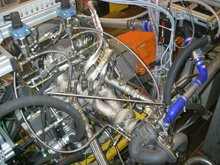 Storing energy with compressed air, rather than batteries, could cut the cost of hybrid vehicles.
Storing energy with compressed air, rather than batteries, could cut the cost of hybrid vehicles.
A new kind of hybrid vehicle being developed at the Swiss Federal Institute of Technology in Zurich could save almost as much fuel as today's gas-electric hybrids, but at a fraction of the cost. Swiss researchers will present the results of experiments with a test version of the new system at the Society for Automotive Engineer's Congress in April.
Conventional gas-electric hybrids use batteries to store energy recovered during braking, which would otherwise be wasted as heat. They later use that energy to drive an electric motor that assists the car's gas engine. But the high-cost of batteries, and the added cost of including two forms of propulsion -- an electric motor and a gasoline engine -- make such hybrids expensive. This has slowed their adoption and limited their impact on overall greenhouse gas emissions from vehicles.
Lino Guzzella, a professor of mechanical engineering at the Swiss Institute, is developing a hybrid that requires no battery or electric motor. Instead, it stores energy by using the engine's pistons to compress air. That air can later be released to drive the pistons and propel the vehicle along. Guzzella says that the system will add only about 20 percent to the cost of a conventional engine, whereas the extra components required in hybrid electric vehicles can add 200 percent to the cost. Computer simulations suggest that the design should reduce fuel consumption by 32 percent, which is about 80 percent of the fuel-savings of gas-electric hybrids, he says. Initial experiments have demonstrated that the design can be built.

Geen opmerkingen:
Een reactie posten